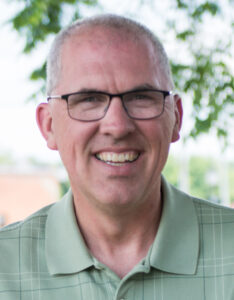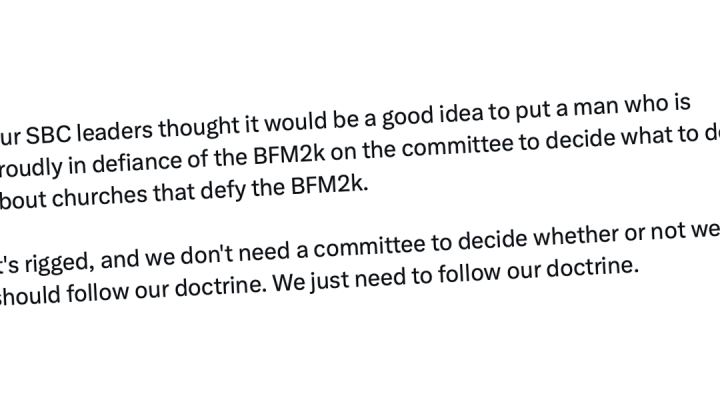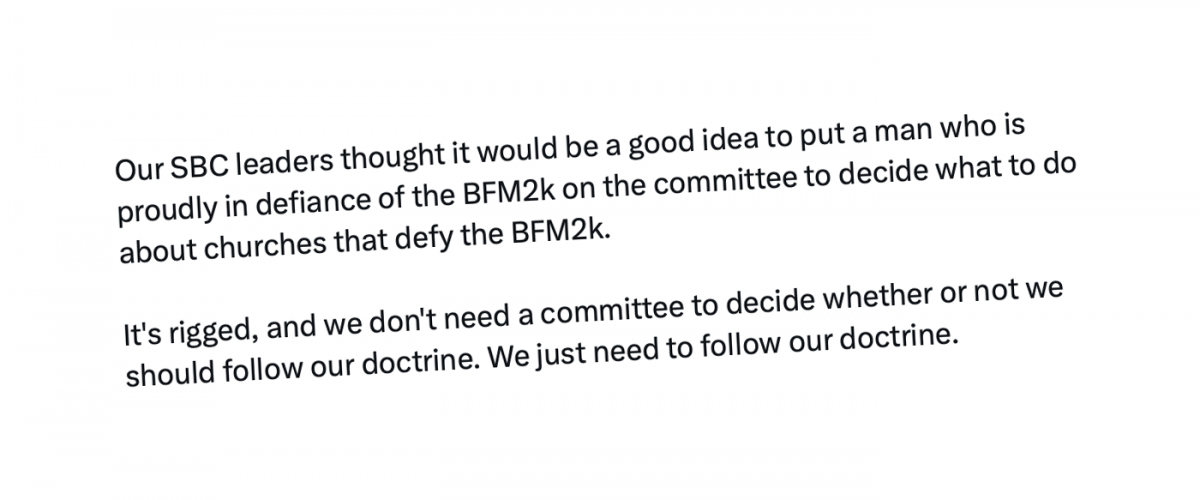Some Southern Baptist Convention pastors who are urging final adoption of a constitutional amendment prohibiting females from being called “pastor” are upset because the SBC has appointed a cooperation committee where not all members agree exactly with their views.
That has prompted SBC President Bart Barber to take to social media to explain that the same convention messengers who voted to approve a first reading of the constitutional amendment in June also instructed him to appoint a “broadly representative” committee to promote cooperation.
Specifically, some of the most conservative pastors in the SBC — typically but not exclusively Calvinists — are troubled by Barber’s appointment of Arlington, Texas, pastor Jason Parades to the Cooperation Group. Parades is a conservative Southern Baptist who serves as pastor at Fielder Road Baptist Church, also a notably conservative church.
Nate Schlomann, executive pastor of Village Church in Midlothian, Va., tweeted: “This is Jason Paredes. He voted to keep Rick Warren and Saddleback in the SBC. He openly states that his church has women pastors. Our SBC leaders thought it would be a good idea to put a man who is proudly in defiance of the BFM2k on the committee to decide what to do about churches that defy the BFM2k. It’s rigged, and we don’t need a committee to decide whether or not we should follow our doctrine. We just need to follow our doctrine. Pass the Law Amendment in Indy.”
BFK2k is insider shorthand for the Baptist Faith and Message, the SBC’s doctrinal statement last revised in the year 2000. The Law Amendment is the name given to the constitutional amendment that passed its first of two required readings this summer.
College Station, Texas, pastor Alan Pittman replied to Schlomann: “Looks like you’re overlooking the fact that Juan Sanchez (an Austin, Texas, pastor) is also on that team. He contributed to the Law Amendment at the convention. Maybe it’s not ‘rigged’ like you claim it is.”
“Why would someone opposed to Juan be put on the committee? To rig it to shift the doctrine.”
To which Schlomann replied: “Juan is in line with the convention’s clearly stated doctrine, as all members of the committee should be. Why would someone opposed to Juan be put on the committee? To rig it to shift the doctrine.”
Schlomann’s tweets represent a continued pattern of the most conservative wing of the SBC demanding total conformity to their views. This is one of the reasons for several recent years of friction between the already conservative leadership of the SBC and those who are even more conservative.

Bart Barber
This is the background, then, to a thread of tweets published by Barber Sept. 15, which began: “I have seen multiple questions directed at me regarding the makeup of the Cooperation Group, particularly addressing the inclusion of Jason Paredes.”
Barber explained he believes the SBC president has three jobs: “Protect the messengers’ rights, answer the messengers’ questions, implement the messengers’ instructions.” In SBC polity, “messengers” are those authorized to vote at annual meetings.
“My responsibility in appointing this group is to follow the wording of the motion and the expressed will of the convention’s messengers,” Barber continued. “The relevant words of the motion are the two words ‘broadly representative.’ The Cooperation Group contains a mixture of men and women, pastors and laypeople and denominational workers, people from various parts of our geography, and people of different ages. Additionally, following the messengers’ instructions, the Cooperation Group contains people broadly representative of the various points of view that comprise the family of churches that is the Southern Baptist Convention.
“The messengers are therefore on the record as desiring a study group that was ideologically ‘broadly representative.’”
“It is particularly relevant that a motion to amend by Dusty Deevers of Oklahoma was overwhelmingly defeated. This amendment would have stricken the words ‘broadly representative’ from the motion and would have tightly constrained the makeup of the group. Messengers decisively rejected Deevers’ proposal. The messengers are therefore on the record as desiring a study group that was ideologically ‘broadly representative.’
“The breadth of the Southern Baptist Convention includes people and churches who do not affirm the entirety of the Baptist Faith and Message. In fact, it includes quite a lot of them, depending upon which article of the BF&M is in view (open communion?). At present, Article III of our Constitution requires that churches have a faith and practice that ‘closely identifies with’ the Baptist Faith and Message. The phrase ‘closely identifies with’ expressly does not require total agreement with our confession of faith.”
Barber concluded: “By including a slim minority of the Cooperation Group who have disagreements with the BF&M on matters of present controversy within our convention, I have followed the clearly expressed will of the messenger body and the unmistakable wording of the motion. My duty is to implement those instructions, not to follow opinions expressed on social media or even my own druthers about the matter. The messengers adopted this motion by a strong majority. They expect me to do what they said. This I have sought to do.
“In my opinion, the best way to evaluate a committee, task force, or study group is not by fretting over a single member who troubles you but by evaluating the product of their work. The Cooperation Group can do nothing … NOTHING … without the approval of the messengers. So, both on the front end and on the back end of this process, the messengers’ voice will be the decisive voice.”
The exact wording of the motion adopted in June to create the Cooperation Group says: “I move that the convention authorize the SBC president to appoint a broadly representative task force from across our convention to study the issue of how this convention should deem churches to be in friendly cooperation on questions of faith and practice as laid out in Article 3.1 of the Constitution referencing our adopted statement of faith and to bring back recommendations to the 2024 SBC annual meeting in Indianapolis for how we can move forward together in biblical fidelity, missional clarity, and cooperative unity.”
Barber already had upset some SBC insiders by naming Arlington, Texas, pastor Jared Wellman chair of the Cooperative Group. Wellman is a former chairman of the SBC Executive Committee who earlier this year was nominated by a search committee to become president of the Executive Committee — the top permanent staff role — but was voted down by Executive Committee members in a dispute over process.
Related articles:
SBC Executive Committee rejects nominee for president
SBC president urges churches considering leaving to ‘press pause’


